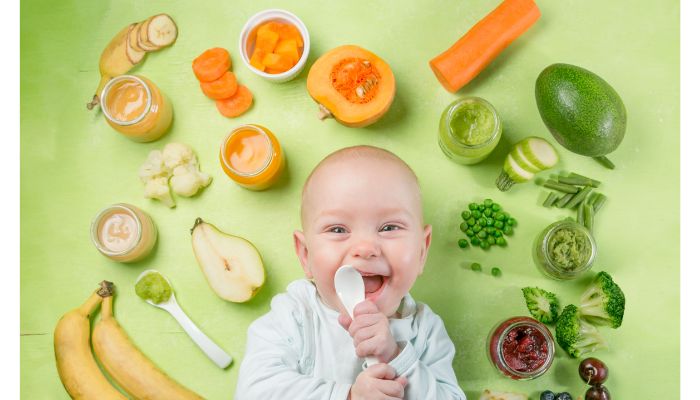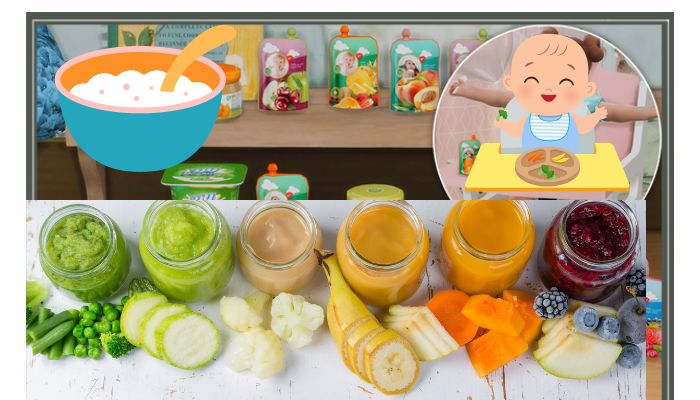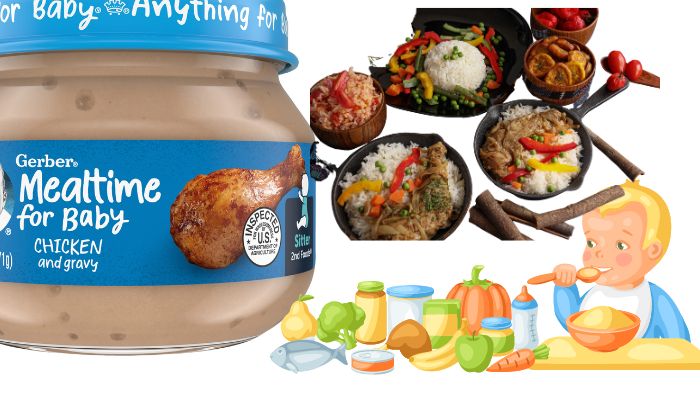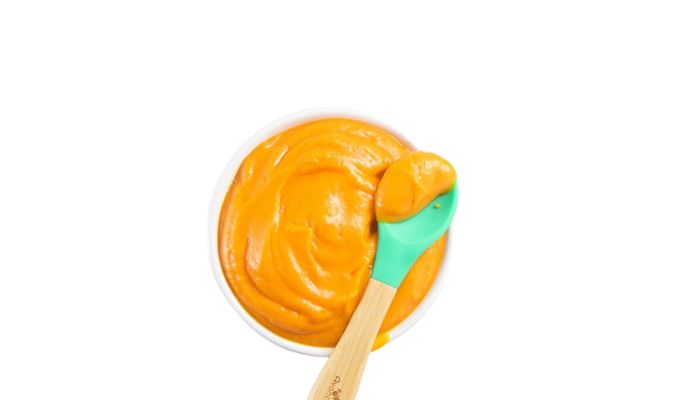If you’re a parent or caregiver looking for nutritious options for your little one, you’ve come to the right place! In this article, we’re going to talk about a popular choice for babies: chicken baby food.
Chicken baby food is a tasty and convenient way to introduce protein into your baby’s diet. It’s packed with essential nutrients like iron, zinc, and vitamin B12, which are important for their growth and development.
But not all chicken baby food is created equal. In the next few paragraphs, we’ll explore the benefits of chicken baby food, how to choose the best options, and even share some easy homemade recipes. Let’s dive in!
If you want to prepare homemade baby food using chicken, follow these steps for a healthy and tasty meal:
Step 1: Choose organic chicken and remove any skin or bones.
Step 2: Cook the chicken thoroughly and let it cool.
Step 3: Blend the chicken in a food processor or blender until smooth.
Step 4: Add breast milk or formula to achieve desired consistency.
Step 5: Serve the chicken puree or freeze it for future use.
Enjoy preparing delicious and nutritious chicken baby food for your little one!
The Benefits of Chicken Baby Food: Nourishing and Delicious
Introducing solid foods to your baby is an exciting milestone, and choosing the right foods is essential for their growth and development. When it comes to adding protein to their diet, chicken baby food is an excellent choice. Packed with essential nutrients, chicken not only provides the necessary building blocks for your baby’s developing body but also offers a flavorful and versatile option that they are sure to enjoy. In this article, we will explore the benefits of chicken baby food and discover why it is a nutritious and delicious option for your little one.
The Nutritional Powerhouse of Chicken Baby Food
Chicken is a lean source of protein that contains all the essential amino acids needed for your baby’s growth and development. Protein is vital for building and repairing cells, and it plays a crucial role in the development of muscles, organs, and tissues. Additionally, chicken is rich in iron, which is necessary for the production of hemoglobin, the protein in red blood cells responsible for transporting oxygen to all parts of the body. By including chicken baby food in your little one’s diet, you can ensure they receive a healthy dose of protein and iron.
Furthermore, chicken is a good source of B vitamins, such as vitamin B6 and niacin. These vitamins are essential for your baby’s brain development, energy production, and overall growth. Chicken also provides important minerals like zinc, which supports a healthy immune system, and selenium, which acts as an antioxidant and helps protect cells from damage. With its impressive nutritional profile, chicken baby food offers a well-rounded and wholesome option for your baby’s meals.
Chicken Baby Food vs. Other Protein Sources
When it comes to introducing protein into your baby’s diet, chicken baby food has several advantages over other protein sources. Compared to red meat, chicken is lower in fat, making it a leaner option. This makes it easier for babies to digest and reduces the risk of gastrointestinal discomfort. Furthermore, chicken is less likely to cause allergic reactions compared to other proteins like eggs or peanuts, making it a safer choice for babies with food sensitivities.
Another benefit of chicken baby food is its versatility. Chicken can be cooked in a variety of ways, such as steamed, baked, or poached, allowing you to choose the best method for your baby’s dietary needs and preferences. Additionally, chicken pairs well with a wide range of flavors, making it easy to create delicious and nutritious meals by combining it with fruits, vegetables, or grains. This versatility ensures that your baby receives a diverse and balanced diet.
Tips for Introducing Chicken Baby Food
When introducing chicken baby food to your little one, it’s important to follow a few guidelines to ensure their safety and enjoyment. Start by offering small amounts of chicken and watch for any signs of allergic reactions. If your baby has never had chicken before, it’s a good idea to introduce it gradually and wait for a few days before introducing new foods to identify any potential allergies or sensitivities.
To prepare chicken baby food, make sure the chicken is thoroughly cooked and free from any seasoning or additives. You can easily puree chicken in a food processor or blender to achieve a smooth texture suitable for your baby’s needs. Alternatively, you can offer small, soft pieces of well-cooked chicken for your baby to practice self-feeding and develop their motor skills.
Incorporate chicken baby food into a balanced diet that includes a variety of fruits, vegetables, and grains. By offering a range of flavors and textures, you can help develop your baby’s taste preferences and encourage healthy eating habits from an early age.
Delicious Chicken Puree Recipes for Your Little One
Now that we have explored the benefits of chicken baby food, let’s dive into some delicious recipes that are sure to delight your little one’s taste buds. These recipes use chicken as the main ingredient and incorporate a variety of other nutritious ingredients to create tasty and wholesome meals.
1. Creamy Chicken and Sweet Potato Puree
Ingredients:
- 1 boneless, skinless chicken breast
- 1 sweet potato, peeled and diced
- 1 cup of low-sodium chicken broth
- 1/2 cup of unsweetened coconut milk
- 1/4 teaspoon of turmeric
- Pinch of cinnamon
- Pinch of nutmeg
Instructions:
- In a saucepan, combine the chicken breast, sweet potato, chicken broth, coconut milk, turmeric, cinnamon, and nutmeg.
- Bring the mixture to a boil, then reduce the heat and simmer until the chicken is cooked through and the sweet potato is tender.
- Remove the chicken from the saucepan and shred it using a fork.
- Transfer the sweet potato and broth mixture to a blender or food processor and puree until smooth.
- Add the shredded chicken back into the puree and blend briefly to combine.
- Allow the puree to cool before serving to your little one.
This creamy and flavorful puree is packed with protein, fiber, and essential nutrients. The sweet potato adds a touch of natural sweetness and offers additional vitamins and minerals. You can adjust the consistency of the puree by adding more or less broth to suit your baby’s preferences.
2. Apple Cinnamon Chicken Puree
Ingredients:
- 1 boneless, skinless chicken thigh
- 1 apple, peeled, cored, and diced
- 1 teaspoon of cinnamon
- 1/4 cup of water
Instructions:
- In a skillet, heat a small amount of oil and cook the chicken thigh until fully cooked and no longer pink.
- Remove the cooked chicken from the skillet and allow it to cool before shredding it.
- In the same skillet, add the diced apple, cinnamon, and water.
- Cook the apple over medium heat until it becomes soft and tender.
- Transfer the cooked apple and shredded chicken to a blender or food processor and puree until smooth.
- Let the puree cool down before serving it to your baby.
This simple yet delicious puree combines the sweetness of apples with the savory flavors of chicken. The cinnamon adds a warm and comforting touch to the puree, making it perfect for fall or winter months. Apple and chicken are a delightful flavor combination that your baby is sure to enjoy.
3. Spinach and Chicken Rice Bowl
Ingredients:
- 1 boneless, skinless chicken breast, grilled and diced
- 1 cup of cooked brown rice
- 1 cup of fresh baby spinach, chopped
- 1/2 cup of cooked peas
- 1/4 cup of unsalted chicken broth
- 1/4 teaspoon of garlic powder
- 1/4 teaspoon of onion powder
Instructions:
- In a skillet, combine the diced chicken breast, cooked brown rice, chopped baby spinach, cooked peas, chicken broth, garlic powder, and onion powder.
- Cook the mixture over medium heat until the ingredients are heated through and well combined.
- Remove from heat and let it cool slightly before serving it to your baby.
This baby-friendly rice bowl is packed with protein, fiber, and essential vitamins and minerals. It offers a savory and well-rounded flavor profile that introduces your little one to different textures and tastes. You can adjust the consistency of the rice bowl by adding more or less chicken broth to accommodate your baby’s preferences.
By incorporating these delicious chicken puree recipes into your baby’s meals, you can ensure they receive a nutritious and flavorful diet. Remember to consult with your pediatrician before introducing new foods to your baby and always prioritize their safety and enjoyment during mealtime. Enjoy this exciting journey of introducing your little one to the world of flavors and textures, and watch as they develop a love for food and healthy eating habits.
Important Considerations When Preparing Chicken Baby Food
As a parent preparing chicken baby food, it’s crucial to take certain precautions and follow safe food handling practices. Here are some important considerations to keep in mind:
Choosing Quality Chicken
When selecting chicken for your baby’s food, opt for high-quality, organic chicken that is free from hormones and antibiotics. This ensures that your baby is not exposed to any harmful substances and receives the best possible nutrition. Organic chicken is also more likely to be raised in humane conditions, contributing to a more sustainable and ethical food system.
Safe Food Handling and Preparation
Proper food handling and preparation are essential to prevent the risk of foodborne illness. Here are some guidelines to follow:
- Thoroughly wash your hands before handling chicken and any other ingredients.
- Keep raw chicken separate from other foods to avoid cross-contamination.
- Cook chicken to an internal temperature of 165°F (74°C) to ensure it is safe to eat.
- Refrigerate any leftover chicken baby food promptly to prevent bacterial growth.
- Discard any open jars of chicken baby food that have been stored in the refrigerator for more than 24 hours.
By following these guidelines, you can ensure the safety and quality of the chicken baby food you prepare for your little one.
Diversify Your Baby’s Diet with Chicken Baby Food
Introducing chicken baby food into your little one’s diet offers a range of benefits, from providing essential nutrients to promoting healthy growth and development. Chicken is a versatile protein source that pairs well with various flavors and can be prepared in different ways to suit your baby’s preferences. By incorporating delicious chicken puree recipes into their meals and following safe food handling practices, you can give your baby a nutritious and enjoyable culinary experience. Remember to consult with your pediatrician before introducing new foods and always prioritize their safety and enjoyment during mealtime. Bon appétit!
Key Takeaways: Chicken Baby Food
- 1. Chicken baby food provides essential protein for healthy growth.
- 2. It is a great source of iron, which aids in oxygen transportation.
- 3. Chicken baby food is easy to digest and gentle on the stomach.
- 4. It is important to choose organic chicken baby food to avoid potential harmful additives.
- 5. Introducing chicken baby food gradually can help identify any allergies or adverse reactions.
Please let me know if you need further assistance!
Frequently Asked Questions
When it comes to feeding your baby, choosing the right food is important. Here are some common questions about chicken baby food.
1. Can I feed my baby chicken baby food?
Yes, you can feed your baby chicken baby food. Chicken is a great source of protein and essential nutrients for growing babies. However, it is important to choose age-appropriate chicken baby food and introduce it gradually.
Start by offering small amounts of finely pureed chicken and gradually increase the portion size as your baby becomes more comfortable with it. Always ensure that the chicken is fully cooked and has a smooth texture to avoid any choking hazards.
2. At what age can I introduce chicken baby food?
You can start introducing chicken baby food to your baby around 8 to 9 months of age. At this stage, most babies have already tried a variety of fruits, vegetables, and grains, and are ready to add protein-rich foods like chicken to their diet.
Before introducing chicken, make sure your baby has successfully tolerated other solid foods and does not have any known allergies. It’s a good idea to consult with your pediatrician before introducing chicken or any new food to your baby’s diet.
3. How should I prepare chicken baby food at home?
Preparing chicken baby food at home is simple and allows you to have complete control over the ingredients and preparation methods. Start by purchasing high-quality boneless, skinless chicken breasts. Cook the chicken thoroughly by boiling, baking, or steaming it until it reaches a safe internal temperature of 165°F (74°C).
Once the chicken is cooked, allow it to cool and then puree it in a food processor or blender until you achieve a smooth consistency. You can also mix the pureed chicken with a small amount of liquid, such as breast milk or formula, to make it easier for your baby to swallow. Divide the pureed chicken into small portions and freeze them in ice cube trays or small containers for later use.
4. Can I mix chicken baby food with other ingredients?
Absolutely! Mixing chicken baby food with other ingredients can help provide a variety of flavors and nutrients for your baby. You can try adding pureed vegetables, such as sweet potatoes or peas, to create a balanced meal. You can also mix in cooked grains like rice or quinoa to add texture and extra nutrients.
Be mindful of any potential allergenic foods and introduce new ingredients one at a time, waiting a few days before introducing something new. This will help you identify and address any potential food allergies or sensitivities.
5. Are there any store-bought options for chicken baby food?
Yes, there are many store-bought options for chicken baby food available in the market. Look for baby food brands that offer organic or natural options without added preservatives or artificial ingredients. Read the labels carefully to ensure that the chicken baby food is age-appropriate and free from any potential allergens.
You can also explore different flavors and combinations offered by various baby food brands to add variety to your baby’s diet. Remember to always check the expiration date and packaging integrity before purchasing any store-bought chicken baby food.
Quick & Easy Chicken Puree for 8-18M Babies | Carrot-Chicken-Potato Puree | Weight Gain Baby Food!
Summary
Chicken baby food is a nutritious option for babies starting solid foods.
It is rich in protein and essential vitamins, helping with growth and development.
Introducing chicken gradually and in small portions can help prevent allergies.
Choose organic and hormone-free chicken to ensure the best quality for your baby.
Cook the chicken thoroughly and puree it to a smooth consistency before serving.
Remember to consult with your pediatrician before introducing any new foods to your baby.
In conclusion, chicken baby food is a healthy and delicious option for your little one.





